Dubai will invest in Pakistani logistics infrastructure. DP World will act on behalf of the Dubai Government
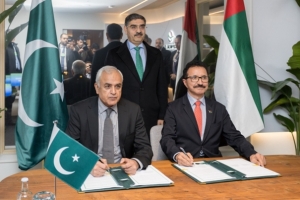
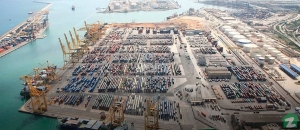
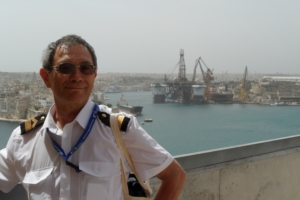 By Marek Grzybowski
By Marek Grzybowski
The agreements between the governments of Dubai and Pakistan were signed at the World Economic Forum in Davos, Switzerland. Pakistan was represented by H.E. Shahid Ashraf Tarar, Federal Minister of Communications, Railways and Maritime Affairs, Islamic Republic of Pakistan. Dubai was represented by Sultan Ahmed bin Sulayem, Chairman of the Ports, Customs and Free Zone Corporation (PCFC) of the Government of Dubai.
The governments of Dubai and the Islamic Republic of Pakistan have signed two intergovernmental framework agreements to strengthen their relations in the maritime and logistics sectors, including the potential establishment of a dedicated freight corridor and economic zone near Karachi.
The agreements were signed at the World Economic Forum in Davos, Switzerland, by H.E. Shahid Ashraf Tarar, Federal Minister of Communication, Railways and Maritime Affairs, Islamic Republic of Pakistan, and Sultan Ahmed bin Sulayem, Chairman of Ports, Customs and Free Zone Corporation (PCFC), Government of Dubai.
DP World will act on behalf of the Dubai Government, while state-run Pakistan Railways and Port Qasim Authority will act on behalf of the Pakistan Government, for the development of the projects.
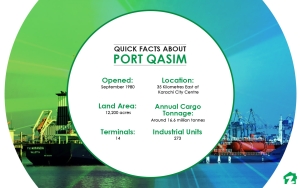
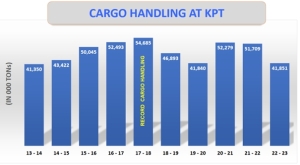
Pakistan – a market with a population of 300 million
– Pakistan is a growing market and an important trade corridor to Central Asia. We are proud to have contributed to its trading capacity through our operations at the Qasim International Container Terminal,” said Sultan Ahmed bin Sulayem, president and CEO of DP World.
He also emphasized, “we are honored to collaborate with various government organizations of Pakistan to develop new cargo transportation systems and with the Qasim Port Authority to improve port communications and investments.”
He noted that the investments “will serve Pakistan’s growing population, which is estimated to reach 300 million in the coming decade. These investments will ensure further integration with the region.”
DP World will act on behalf of the Government of Dubai, while State-owned Pakistan Railways and Qasim Port Authority will act on behalf of the Government of Pakistan to develop the projects included in the signed agreements.
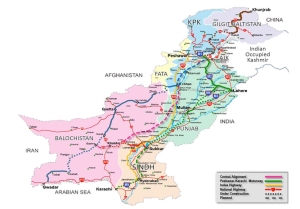
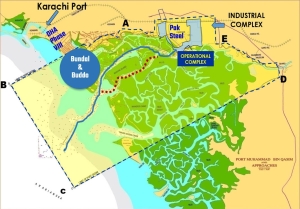
Dedicated Freight Corridor and Economic Zone near Karachi
The Dedicated Transport Corridor is planned to run from the port of Karachi on the Arabian Sea, through Karachi, the most populous city of Pakistan. The rail link will be extended to Pipri marshalling yard, approximately 45 km from Karachi.
The investor claims that the investment in railway infrastructure will improve the efficiency of the transport system between the port and the domestic market. The transportation time of goods will be shortened and the overall logistics costs of goods arriving by sea or exported through the port will be reduced.
Lahore-based Pakistan Railways is Pakistan’s national, state-owned railway company. Pakistan Railways manages almost 8,000 km of railway lines across the country, from Torkham in the northwest to Karachi in the south.
Accessibility to the port is to be ensured by deepening the port channel. A second framework agreement was signed with the Ministry of Maritime Affairs of Pakistan to carry out these works. DP World will carry out the investment on behalf of the Dubai government and will carry out the dredging of the port channel.

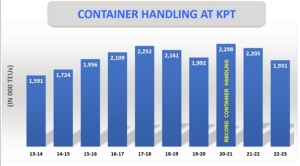
Development of the port and economic zone
Under this framework agreement, an economic zone will also be established in Port Qasim, which is expected to attract foreign direct investment worth over USD 3 billion. The announcement emphasizes that “DP World, on behalf of the Government of Dubai, will implement the development of the economic zone with the aim of maximizing economic activity in Pakistan.”
The investments and business activities carried out in Pakistan are a continuation of previously implemented trade and investment activities. DP World started operations in Pakistan in 1997 at the Qasim International Container Terminal (QICT). At that time, it was the first terminal of this type in the country. To this day, this terminal has been expanded to a port that, according to the operator, is “the leading gateway for global trade in the region.”
Speaking at the signing ceremony, Sultan Ahmed bin Sulayem, Chairman of PCFC and Group Chairman and CEO of DP World, said: “Pakistan is a growing market and an important trade corridor to Central Asia.”
“We are proud to have contributed to its commercial capacity through our operations at the Qasim International Container Terminal and are honored to collaborate with various Pakistani government organizations to develop new cargo transportation systems and with the Qasim Port Authority to improve port connectivity and investment,” Sultan said Ahmed bin Sulayem.
It has been emphasized several times that they will help Pakistan’s growing population, which is estimated to reach 300 million in the coming decade.
H.E. Shahid Ashraf Tarar, Federal Minister for Communications, Railways and Maritime Affairs, said: “DP World has long been proud of its presence in Pakistan, as evidenced by this mutually rewarding engagement.”
– Based on unwavering trust and partnership, both brotherly countries have decided to further consolidate economic cooperation through groundbreaking projects. The signing of framework investment agreements highlights the importance of Pakistan as a gateway to Asia and the trade dividends associated with its strategic location, said the Minister of Communications, Railways and Maritime Affairs of Dubai.
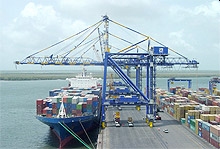
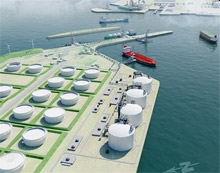
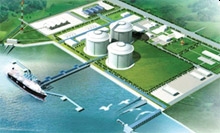
Karachi – Pakistan’s gateway to the world
Karachi Port Trust (KPT) is a seaport in Pakistan. KPT has the potential and terminal equipment to handle over 125 million tons of cargo, including 4.25 million TEU (containers), according to the port management. The Port of Karachi has also leased areas to three private container terminal operators. Bulk terminals can handle up to 50 million tons of goods, and fuel terminals can handle up to 25 million tons.
Karachi Port Trust recorded a record number of cargo transhipment in 2017-2018, approaching 54.7 million tonnes. However, in the financial year 2022-2023, it utilized the potential to a lesser extent, exceeding 41.8 million tonnes.
Container handling at the port is provided by three terminal operators, KGTL on East Wharve, KICT on West Wharf and SAPTL on South Wharf. “Statistics from the last 10 years show record container transshipment in 2020-2021,” emphasizes the Karachi Port Authority. At that time, approximately 2.3 million TEUs were transhipped. For comparison, in 2013-2014, approximately 1.6 million TEUs were transhipped in container terminals, and in 2022-2023, it was over 1.93 million TEUs.
Drawings, photos, charts: Port Qasim, https://www.dpworld.com, Port Karachi, https://www.zameen.com
